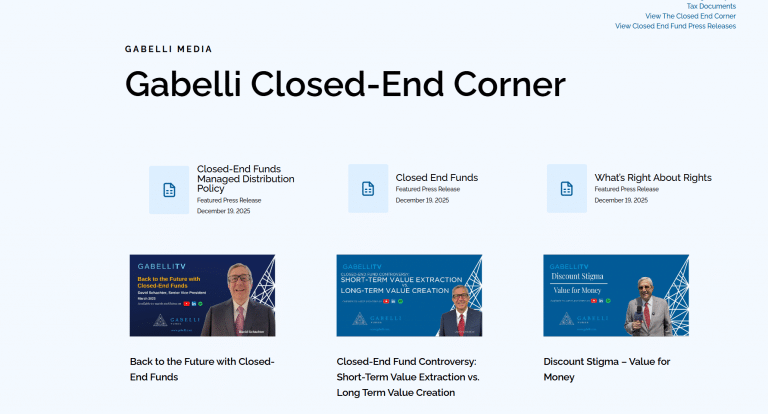2025 Global Gaming Expo
Gabelli Funds is pleased to announce our participation at the Global Gaming Expo (G2E), taking place October 7–9 at The Venetian Expo in Las Vegas. G2E is the premier gathering for the gaming industry, showcasing the latest innovations, technologies, and market developments. Investment Team members Gustavo Pifano and Justin McAuliffe will be attending the show to meet with companies and engage with investors. We welcome the opportunity to connect during the event.
Gabelli Funds has been an active investor in the gaming and lodging sector for over forty years. We continue to see catalyst-driven opportunities in the industry as digital transformation and evolving regulation drive change across North America, EMEA, and Latin America. This White Paper provides an update on key global gaming markets and offers brief overviews of companies we expect to engage with during G2E.
VIVA(?) LAS VEGAS:
LAS VEGAS MARKET OVERVIEW
Las Vegas has recently drawn attention due to concerns about slowing visitation, reduced international tourism, and weakening demand amid shifting perceptions of the value of a Las Vegas trip. The most concerning data comes from the Las Vegas Convention and Visitors Authority (LVCVA), which publishes monthly visitation statistics. In August, total visitation declined 6.7% year-over-year. On a year-to-date basis, the city welcomed 19.55 million visitors, representing a decline of approximately 7% compared to the same period last year.
Las Vegas Strip operators have identified Canadian tourists as the largest source of the decline in international visitation, a trend likely influenced by geopolitical factors. At the same time, higher prices implemented since the pandemic have made a Las Vegas vacation appear less enticing from a value perspective.
Despite these headwinds, operating fundamentals appear to be more resilient than suggested by some media reports. In the second quarter, casino revenues for the three largest operators declined only 1% year-over-year, while entertainment, retail, and other revenues remained flat. The greatest pressures were seen in non-gaming segments, with hotel revenues down 3% and food and beverage experiencing the steepest decline at 6% year-over-year.
Table 1 Largest Las Vegas Strip Operators Revenue by Source (Trailing 6 Quarters)
$, millions
Source: Wynn Resorts, Caesars Entertainment, and MGM Quarterly Filings
We believe the recent declines in non-gaming revenues are largely driven by comp dynamics given the extreme growth in non-gaming revenue over the last few years. As is illustrated in the graph below, non-gaming revenues have grown well above historical trend since 2022 even when adjusting for the pandemic.
Exhibit 1 Las Vegas Gaming and Non-Gaming Revenues 1990-2024 ($, millions)
Source: Nevada Gaming Control Board
While third-quarter performance is expected to remain subdued in line with management commentary, conditions are likely to improve in the fourth quarter, with the Formula 1 GP scheduled for November 21–23 serving as a potential early indicator of strengthening demand. Looking ahead to 2026, a robust convention calendar is expected to further support visitation and drive year-over-year revenue growth for Strip operators. Our outlook for non-gaming revenues calls for a 5% decline in hotel revenues and an 8% decline in food and beverage in 2025, returning to the historical growth trendline in 2026 and beyond.
Exhibit 2 Las Vegas Non-Gaming Revenues 1990-2028 ($, millions)
Source: Nevada Gaming Control Board, Gabelli Funds Estimates
Table 2 Las Vegas Non-Gaming Revenues ($ millions)
Source: Nevada Gaming Control Board, Gabelli Funds Estimates
On the gaming side, we see Strip gross gaming revenues (GGR) showing slight growth this year, with Las Vegas Locals GGR growing low single digits. Looking out to 2026 and beyond, we expect GGR to grow roughly in line with nominal GDP, or low single digits.
Table 3 Las Vegas Gross Gaming Revenues ($, millions)
Source: Nevada Gaming Control Board, Gabelli Funds Estimates
LET’S TALK STOCKS – LAND BASED OPERATORS
Bally’s Corp. (BALY-$11.40-NYSE), headquartered in Providence, Rhode Island, owns and operates 19 casinos across 11 U.S. states, along with the Bally’s Golf Link at Ferry Point in New York, the Arapahoe Park Horse Track in Colorado, and online sports betting and iGaming through BallyBet. The Bally’s of today is the result of a buy-and-build strategy accelerated by its largest shareholder, Standard General L.P., beginning with the reverse merger of Twin River Worldwide Holdings and Dover Downs Gaming & Entertainment in 2019. Bally’s acquired the Tropicana Las Vegas’s non-land assets for $148 million in September 2022 and agreed to a 50-year ground lease with GLPI at an initial annual rent of $10.5 million. The Tropicana was demolished last October, making way for a new resort and a Major League Baseball stadium for the relocating Oakland Athletics, scheduled to open in the 2028–29 season. Following Standard General’s merger agreement to acquire Bally’s at $18.25 per share, which closed in February 2025, the firm increased its ownership in the newly recapitalized company to approximately 74% of outstanding shares. In July 2025, Bally’s agreed to sell its international interactive business (formerly Gamesys) to Intralot S.A., a global lottery operator and technology provider, in a €2.7 billion cash-and-share deal expected to close in Q4 2025; the transaction unlocks value, is expected to reduce leverage, and provides balance sheet flexibility for land-based development projects. Bally’s continues to advance its flagship Chicago casino, slated to open in 2026, while progressing towards a New York license with its proposed $4 billion project at Ferry Point in the Bronx. Despite steady performance at its regional casinos and a promising development pipeline, Bally’s stock has lagged peers amid high leverage, execution risk around its Chicago project, difficulties scaling digital operations, and relatively low trading liquidity.
Boyd Gaming (BYD-$87.03-NYSE), headquartered in Las Vegas, NV, operates 28 casinos across 10 states. 11 of its properties are located in Nevada across the Las Vegas Locals and Downtown Las Vegas markets. In November of 2022, Boyd acquired Pala Interactive, a B2B and B2C online gaming technology company. Boyd’s Interactive division offers both real money online casino games as well as social casinos through the branded app Stardust. In July, Boyd announced they are monetizing their 5% stake in FanDuel by selling to majority owner Flutter for $1.76 billion which also included extending the market access agreements through 2038. Management plans to use the proceeds to pay down approximately $1.6 billion of debt. Pro-forma for the FanDuel stake sale proceeds would have leverage below 2x, which provides significant optionality. Boyd owns the majority of its real estate and employs a balanced capital allocation policy reinvesting into its portfolio while also returning capital to shareholders in the form of share repurchases and a regular dividend.
Caesars Entertainment (CZR-$25.95-NASDAQ), headquartered in Reno, NV, operates 51 casinos across 16 states, online sports betting in 20 jurisdictions and iCasino in six jurisdictions, under a portfolio of brands including Harrah’s, Horseshoe, Caesars, Isle of Capri, and Eldorado. Caesars operates nine destination properties on the Las Vegas Strip: Caesars Palace, Harrah’s Las Vegas, the Rio, Planet Hollywood, Paris Las Vegas, the LINQ, Horseshoe Las Vegas, the Flamingo, and the Cromwell. The current incarnation of the company was created through an acquisition by Eldorado Resorts which closed shortly after the global pandemic struck in early 2020. Negative investor perception of demand for the Las Vegas Strip has been a recent headwind for shares. The company has been on a multi-year journey to deleverage through free cash flow, a slow but steady process which has also continued to weigh on the share price. The combination of an interest rate cutting cycle and the company coming to the end of a capital investment cycle should help to accelerate deleveraging as free cash flow increases. Caesars’ Digital business represents a potential near-term catalyst, as the implied multiple is well below peers. Management have discussed exploring potential strategic options to surface value which may come as soon as the first half of 2026.
Golden Entertainment (GDEN-$23.69-NASDAQ), headquartered in Las Vegas, NV, operates a portfolio of eight casinos as well as a chain of 65 taverns in the Las Vegas valley under the brand PT’s Taverns. Their casino portfolio consists of the STRAT, a destination property located on the far north end of the Las Vegas Strip, and regional resorts in Laughlin, NV: the Aquarius, Edgewater, and Colorado Belle. Its portfolio of locals casinos include two Arizona Charlie’s in Las Vegas and several properties in Pahrump, NV, about 60 miles west of Las Vegas. Shares have been under pressure as the demand softness in Las Vegas has weighed on the performance of the STRAT, and the taverns business has been impacted by heightened promotional activity from competitors. Golden owns all its real estate, which if monetized could represent a significant portion of the entire market cap of the company. Management would likely need to find a buyer for the remaining OpCo if there were to pursue a sale of the real estate in a similar structure to the Rocky Gap property in Maryland. In the meantime, Golden remains one of the least leveraged gaming companies and could continue to return capital to shareholders in the form of the regular quarterly dividing, a potential special dividend, and share repurchases.
Full House Resorts (FLL-$3.14-NASDAQ), headquartered in Las Vegas, NV, operates six casinos across the five states of Colorado, Illinois, Indiana, Mississippi, and Nevada. Over the last few years, FLL has developed two new properties that represent significantly larger earnings potential relative to the legacy properties. The Temporary at American Place in Waukegan, IL, opened in February 2023, has already doubled the operating earnings of the company. The most recent development, Chamonix in Cripple Creek, CO, which opened in December of 2023, has been slower to scale its operations. The casino is located in a historically smaller market and aims to expand the overall gaming penetration, drawing from nearby Colorado Springs. While Chamonix may take years to scale and its ultimate potential remains unclear, it could represent significant growth over the long term. Looking forward, FLL will develop the permanent casino American Place in Waukegan over the next few years which will continue to provide the company with an attractive growth pipeline, however in the short-term a lack on certainty on financing for the permanent has likely impacted share price performance.
MGM Resorts (MGM-$34.69-NYSE), headquartered in Las Vegas, NV, operates nine Las Vegas Strip resorts and seven regional properties. Their Strip portfolio consists of the Aria, Bellagio, Cosmopolitan, MGM Grand, Mandalay Bay, Luxor, Excalibur, New York-New York, and the Park MGM. Additionally, MGM through its controlling interest in MGM China, owns two integrated resorts in Macau. The company also has a 50/50 JV in BetMGM, a top operator in online sports betting and iGaming. In 2022, MGM acquired LeoVegas, an iGaming and online sports betting operator in eight jurisdictions in the Nordics and Europe. The company currently operates the BetMGM brand as a fully owned subsidiary outside of the US and Canada. MGM is also bidding on a downstate casino license in New York, which would allow the conversion of the already operating Empire City Casino at Yonkers Raceway from a limited-license to a full-fledged casino resort. MGM is also currently developing an integrated resort project in Osaka Japan via a JV with the ORIX Corporation. With a total development cost budgeted at $8.9 billion it will be one of the largest casino resorts globally when it opens in 2030.
PENN Entertainment (PENN-$19.10-NASDAQ), headquartered in Wyomissing, Pennsylvania, operates 43 casino properties in 20 US states, online sports betting in 20 jurisdictions and iCasino in five jurisdictions, under a portfolio of brands including Hollywood Casino, L’Auberge, theScore Bet Sportsbook and Casino, and ESPN BET. In August 2023, after terminating its relationship with the Barstool Sports network, PENN entered into an exclusive 10-year licensing agreement with ESPN, replacing its Barstool Sportsbook app with ESPN BET. Under the deal, PENN agreed to annual cash payments of $150 million over the term and granted $500 million in stock warrants. In return, PENN receives exclusive branding rights, promotional services, and integration of ESPN content across its platforms. As of Q2 2025, ESPN BET holds approximately 3% of the U.S. online sports betting market, significantly below its target of ~20% by 2027. Management has indicated that if the brand does not achieve a podium position within three years, it may consider exiting the partnership. Hedge fund HG Vora Capital Management, which owns ~4.8% of PENN Entertainment, initiated a proxy fight in June 2025, electing two directors to push for governance changes and strategic reforms, particularly around digital operations and capital allocation.
Red Rock Resorts (RRR-$60.75-NASDAQ), headquartered in Las Vegas, NV, operates 19 casinos in the Las Vegas locals market through its equity interest in Station Casinos, including flagship properties Red Rock Resort, Palace Station, Green Valley Ranch, and Sunset Station. Durango, opened in December 2023, has had exceptional early performance, adding 108k new customers to the database and is on pace to become one of the highest margin properties in the portfolio. RRR has already begun a $120 million expansion of the property (additional casino space, new high-limit slots, and a ~2,000-space garage) slated for completion in late 2025. The Company is also building on its successful development track record with significant renovations at Sunset Station and Green Valley Ranch. Cannibalization from Durango is moderating, with revenue backfill progressing at core properties. Strategically positioned in high-growth, high-income neighborhoods of the Las Vegas Valley, RRR benefits from robust local demographics and maintains a sizable embedded development pipeline (441 acres of Las Vegas real estate for future projects) reinforcing a multi-year growth runway.
Wynn Resorts (WYNN-$132.03-NASDAQ), headquartered in Las Vegas, Nevada, owns and operates the Wynn and Encore resorts on the Las Vegas Strip, as well as Encore Boston Harbor. Through its majority stake in Wynn Macau, the company also controls two integrated resorts in Macau. Wynn shares have benefited from improved investor sentiment, driven in part by progress on Wynn Al Marjan Island in Ras Al Khaimah, UAE, a large-scale development slated to open in 2027. Upon completion, it is expected to be the region’s only fully integrated resort for several years, providing Wynn with a first-mover advantage. In addition, Wynn continues to benefit from its Macau operations, where market-wide gross gaming revenue (GGR) has been accelerating, with double-digit year-over-year growth since June.
BETTING ON DIGITAL: ONLINE GAMING MARKETS UPDATE
The global gambling market, measured by Gross Gaming Revenues (GGR), has grown steadily since 2015, except for the COVID-19 disruption in 2020, reaching $576 billion in 2024. Both land-based and online segments are forecast to continue growing through 2029, with online channels driving faster expansion. Online channels represented ~28% of global gaming GGR in 2024 and are forecast to exceed 36% by 2029, driven by regulatory liberalization, mobile-first consumer behavior, improved digital infrastructure, and rapid product innovation. For players, online platforms combine convenience, personalized experiences, and a wider array of payment and social features, reinforcing their structural growth advantage over land-based formats.
Table 4 Global Gaming GGR ($ billions)
Source: H2GC, Gabelli Funds Estimates
Seven years after the repeal of the Professional and Amateur Sports Participation Act in 2018, which allowed individual US states to legalize and regulate sports betting, the market has scaled quickly into mainstream entertainment. Today, 40 US states and the District of Columbia have legalized sports betting in some form, 34 of which allow online play. In parallel, seven states have legalized online casinos: Connecticut, Delaware, Michigan, New Jersey, Pennsylvania, Rhode Island, and West Virginia. In the first half of 2025, US Sports Betting GGR and iGaming GGR totaled $7.9 billion and $5.1 billion respectively, on pace for our full-year estimates of $15.8 billion and $10.1 billion. Based on the existing legislative landscape, we forecast US sports betting and iGaming GGR to exceed $24.1 billion and $15.7 billion by 2029 as the market matures.
Exhibit 4 US Sports Betting States Exhibit 5 US Sports Betting States: Online
Source: American Gaming Association
Table 5 US Regulated Sports Betting and iGaming GGR ($ millions)
Source: American Gaming Association, Gabelli Funds Estimates
North Carolina was the last state to launch regulated online sports betting in March 2024, with Missouri set to go live in December 2025. In their 2025 sessions, legislative efforts in Georgia, Oklahoma, South Carolina, and Texas failed to pass or saw little progress. California has been gridlocked after voters overwhelmingly rejected two competing ballot measures in 2022. The earliest a sports betting measure could reappear on the California ballot is 2026, though 2028 is more likely. Despite a slowdown in new states going live, there remains a long runway for growth within existing states. In New York for example, where mobile sports betting has been live since January 2022, handle rose 11% year over year in Week 1 of the 2025–26 NFL season to $527 million, demonstrating that even mature markets continue to grow at a healthy pace as adoption deepens and new products such as in-play and parlay betting drive engagement.
We believe the US sports betting market, supported by the world’s largest economy, a highly engaged professional sports fanbase, and the global expansion of online gaming, will continue to present attractive investment opportunities across operators, suppliers, technology providers, and other stakeholders. However, investors should also be attentive to regulatory shifts shaping the sector. Recent tax increases in New Jersey, Illinois, Louisiana, and Maryland highlight the potential for margin pressure, while recurring discussions of higher gambling taxes in the UK underscore the broader global trend of governments seeking a larger share of industry revenues. We also remain mindful of emerging competition from prediction and sweepstakes markets, which have begun to attract interest from consumers and investors. Although these offerings are narrower than regulated sportsbooks and casinos, they may find traction among niche segments or in jurisdictions where sports betting and iGaming remain restricted. Leading incumbents FanDuel and DraftKings have already indicated a willingness to participate in these markets as a strategic hedge. In this environment we favor scaled, geographically diversified operators and suppliers that can better absorb local tax changes and evolving competitive threats.
LET’S TALK STOCKS – DIGITAL
Entain plc (ENT-£8.72-LSE), headquartered in London, England, is a leading global online-led sports-betting and gaming operator. Following its acquisition of the Ladbrokes Coral Group in 2018, it operates 4,500 betting shops across the United Kingdom, Italy, Belgium, Ireland, and Croatia. Its key brands include bwin, Ladbrokes, SuperSport, partypoker and PartyCasino. Entain’s US operations are led through a 50/50 joint venture with MGM Resorts International and the #3 national operator BetMGM. Entain’s geographic diversification, digital scale, and market-leading brands position it to benefit from the ongoing secular expansion of the global online gambling market. The simplified strategic focus under CEO Stella David, targeting organic growth, margin expansion, and US market gains, should reinforce operational resilience and could attractively position the company for potential renewed interest from MGM Resorts, although such interest may not necessarily materialize immediately given the industry’s aversion to M&A throughout periods of macro uncertainty. Activist shareholders, who collectively hold over 10% of Entain’s shares, may advocate for a transaction to unlock value. In the absence of a takeover or BetMGM carveout, there remains strong fundamental value in the core brand portfolio and proprietary technology stack to support sustainable long-term earnings growth.
Flutter Entertainment plc (FLUT-$252.42-NYSE), headquartered in New York City, is the world’s largest online-led gaming operator by revenues. The company operates leading brands including FanDuel, Sky Betting & Gaming, Paddy Power, PokerStars, Sisal, and Betfair across key markets such as the UK & Ireland, North America, and Australia. Flutter’s offerings span sportsbook, iGaming, pari-mutuel wagering, lottery, and daily fantasy sports, with recent acquisitions in Brazil and Italy further expanding its reach. Since the overturn of PASPA in 2018, Flutter’s FanDuel brand has established itself as the dominant market leader in US sports betting, consistently holding around 40% national market share. It has defended this position in an intensely competitive market through product leadership, a user-friendly customer experience, and disciplined promotional spend. Flutter’s proprietary pricing and risk management systems have enabled innovations such as higher-odds parlay offerings, supporting structurally higher win margins. Looking ahead, FanDuel’s profitability should continue to accelerate as contributions from the existing player base more than offset the higher acquisition costs associated with new state launches and the early stages of market development.
Gambling.com Group Ltd (GAMB-$8.31-NASDAQ), headquartered in Saint Helier, Jersey, with operations primarily served from the United States and Ireland, is an affiliate marketing and data services provider for the global online gaming industry. The company utilizes its proprietary technology platform, branded websites, and media partnerships to attract online gaming customers and refer them to licensed online gaming operators, who then convert these leads into actual paying players. It operates in 19 national markets across ten languages through a portfolio of websites including gambling.com and casinos.com. In August 2025, Gambling.com announced its acquisition of Spotlight.Vegas, a bookings platform for Las Vegas events tickets and hotel rooms. We view the company as well positioned to capture expanding US and international online gaming demand. While mindful of AI and search algorithm risks to its SEO business, we believe GAMB’s consistent execution, strong cash generation, and disciplined bolt-on M&A position it well to deliver on management’s long-term EBITDA target of $100 million.
Genius Sports Ltd (GENI-$12.08-NYSE), headquartered in London, England, is provider of data services and technology products to the sports, sports betting and sports media industries. Genius provides live sports data, oddsmaking, risk management and player marketing services to nearly all regulated sportsbook operators. It partners with sports broadcasters to supply alternative broadcast feeds, integrating optical tracking data and graphic overlays in real-time to augment live footage with statistical insights and visual content such as betting odds. Genius also works alongside leagues to protect the integrity of their competitions from the threat of match-fixing through global bet monitoring technology, online and offline education services, and consultancy services including integrity audits and investigations. Lastly, it provides a range of online marketing and fan engagement tools that drive customer acquisition and retention. Genius is the exclusive worldwide distributor of official NFL data to the global regulated sports betting market. It is well positioned to benefit from the growing adoption of in-play betting in the US, a key driver of incremental revenue per user through higher engagement and deeper use of its live data products. Leveraging its scalable technology and data platforms, Genius anticipates that operating leverage will drive significant margin expansion and generate positive cash flow as global demand for sports betting continues to rise.
Inspired Entertainment (INSE-$9.25-NASDAQ), based in New York, NY, provides content, technology, hardware, and services to regulated gaming, betting, lottery, and social operators across land-based and mobile channels worldwide. Its offerings include virtual sports, interactive gaming, and server-based gaming systems, along with associated terminals and digital content. We view Inspired as a compelling investment opportunity due to its innovative product portfolio, strong market presence, and strategic focus on scalable solutions. The company has been increasingly adopting an asset-light strategy, emphasizing scalable digital products like Hybrid Dealer, optimizing its cabinets and terminal operations, and divesting non-core businesses to enhance flexibility and profitability. This ability to adapt to market demands and deliver cost-effective, engaging gaming experiences positions Inspired for sustained growth in the evolving global gaming landscape.
Light & Wonder, Inc. (LNW-$84.59-NASDAQ), headquartered in Las Vegas, Nevada, and formerly known as Scientific Games, is a leading provider of slot machines, gaming content, casino management systems, and table game products and services to licensed gaming operators. Its SciPlay division offers social casino and mobile games to retail customers. In 2022, the company completed the sales of its former Lottery and Sports Betting divisions, transforming itself into a more focused cross-platform games content provider and significantly reducing its debt. In February 2024, Australian competitor Aristocrat Technologies filed a lawsuit in the U.S. against Light & Wonder over alleged IP infringement related to two slots games, with proceedings ongoing and potential financial impact uncertain. Despite the ongoing legal challenge, the company has reaffirmed its 2025 target of $1.4 billion in AEBITDA, highlighting its diverse portfolio of successful game franchises and noting that Dragon Train would have contributed less than 5% to this figure. In July 2025, L&W’s Board approved moving to a sole listing on the Australian Securities Exchange and plans to delist from Nasdaq by November 2025, pending regulatory approvals.
© Gabelli Funds 2025
191 Mason Street Greenwich, CT 06830, Gabelli Funds TEL (914) 921-5000
This whitepaper was prepared by Justin McAuliffe and Gustavo Pifano. The examples cited herein are based on public information and we make no representations regarding their accuracy or usefulness as precedent. The Research Analyst’s views are subject to change at any time based on market and other conditions. The information in this report represent the opinions of the individual Research Analyst’s as of the date hereof and is not intended to be a forecast of future events, a guarantee of future results, or investments advice. The views expressed may differ from other Research Analyst or of the Firm as a whole.
As of June 30, 2025, affiliates of GAMCO Investors, Inc. beneficially owned 6.63% of Full House Resorts, 4.44% of Golden Entertainment, and less than 1% of all other companies mentioned.
This whitepaper is not an offer to sell any security nor is it a solicitation of an offer to buy any security.
Investors should consider the investment objectives, risks, sales charges and expense of any fund carefully before investing.
For more information, visit our website at: www.gabelli.com or call: 800-GABELLI
800-422-3554 • 914-921-5000 • Fax 914-921-5098 • info@gabelli.com










